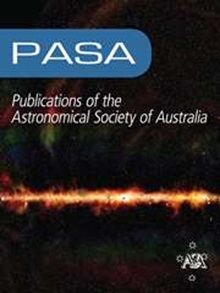Galaxy spin direction asymmetry in JWST deep fields
IF 4.6
3区 物理与天体物理
Q1 ASTRONOMY & ASTROPHYSICS
Publications of the Astronomical Society of Australia
Pub Date : 2024-03-25
DOI:10.1017/pasa.2024.20
引用次数: 0
Abstract
The unprecedented imaging power of JWST provides new abilities to observe the shapes of objects in the early Universe in a way that has not been possible before. Recently, JWST acquired a deep field image inside the same field imaged in the past as the HST Ultra Deep Field. Computer-based quantitative analysis of spiral galaxies in that field shows that among 34 galaxies for which their rotation of direction can be determined by the shapes of the arms, 24 rotate clockwise, and just 10 rotate counterclockwise. The one-tailed binomial distribution probability to have asymmetry equal or stronger than the observed asymmetry by chance is ∼0.012. While the analysis is limited by the small size of the data, the observed asymmetry is aligned with all relevant previous large-scale analyses from all premier digital sky surveys, all show a higher number of galaxies rotating clockwise in that part of the sky, and the magnitude of the asymmetry increases as the redshift gets higher. This paper also provides data and analysis to reproduce previous experiments suggesting that the distribution of galaxy rotation in the Universe is random, to show that the exact same data used in these studies in fact show non-random distribution, and in excellent agreement with the results shown here. These findings reinforce consideration of the possibility that the directions of rotation of spiral galaxies as observed from Earth are not necessarily randomly distributed. The explanation can be related to the large-scale structure of the Universe, but can also be related to a possible anomaly in the physics of galaxy rotation.JWST 深场中的星系自旋方向不对称性
JWST 史无前例的成像能力为观测早期宇宙天体的形状提供了前所未有的新能力。最近,JWST 在过去曾成像过的 HST 超深场内获得了一张深场图像。对该场中的螺旋星系进行的计算机定量分析显示,在 34 个可以通过旋臂形状确定旋转方向的星系中,有 24 个顺时针旋转,只有 10 个逆时针旋转。在单尾二项分布中,不对称等于或强于观测到的不对称的概率为0.012。虽然分析受到数据量较小的限制,但观测到的不对称现象与之前所有主要数字巡天的大规模分析结果一致,都显示该部分天空中顺时针旋转的星系数量较多,而且不对称的幅度随着红移的增大而增大。本文还提供了数据和分析,重现了之前认为宇宙中星系旋转分布是随机的实验,结果表明这些研究中使用的完全相同的数据实际上显示出非随机分布,而且与本文显示的结果非常一致。这些发现加强了人们对从地球上观测到的螺旋星系旋转方向不一定是随机分布的可能性的思考。这种解释可能与宇宙的大尺度结构有关,也可能与星系旋转物理学中可能存在的异常现象有关。
本文章由计算机程序翻译,如有差异,请以英文原文为准。
求助全文
约1分钟内获得全文
求助全文
来源期刊
CiteScore
5.90
自引率
9.50%
发文量
41
审稿时长
>12 weeks
期刊介绍:
Publications of the Astronomical Society of Australia (PASA) publishes new and significant research in astronomy and astrophysics. PASA covers a wide range of topics within astronomy, including multi-wavelength observations, theoretical modelling, computational astronomy and visualisation. PASA also maintains its heritage of publishing results on southern hemisphere astronomy and on astronomy with Australian facilities.
PASA publishes research papers, review papers and special series on topical issues, making use of expert international reviewers and an experienced Editorial Board. As an electronic-only journal, PASA publishes paper by paper, ensuring a rapid publication rate. There are no page charges. PASA''s Editorial Board approve a certain number of papers per year to be published Open Access without a publication fee.

 求助内容:
求助内容: 应助结果提醒方式:
应助结果提醒方式:


